History
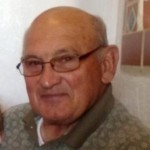
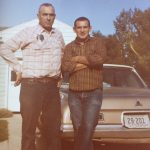 A number of years passed between the first time I met Uncle Butch Schulenberg, who is my father-in-law, Walt Schulenberg’s half-brother, and the reconnecting we had to him after my father-in-law’s passing. I consider those years a great loss, but I am thankful to have him back in our lives. There was no falling out or anything, just a lack of getting together, which is why I consider it such a great loss. It didn’t have to take that long. Uncle Butch is such a wonderful person, and I enjoy his company, and that of his lovely wife, Charlys very much.
A number of years passed between the first time I met Uncle Butch Schulenberg, who is my father-in-law, Walt Schulenberg’s half-brother, and the reconnecting we had to him after my father-in-law’s passing. I consider those years a great loss, but I am thankful to have him back in our lives. There was no falling out or anything, just a lack of getting together, which is why I consider it such a great loss. It didn’t have to take that long. Uncle Butch is such a wonderful person, and I enjoy his company, and that of his lovely wife, Charlys very much.
Butch is a great teller of stories, and I mean the kind I love to hear…family history. The best place to get those family history accounts, is from someone who lived them. Growing up the son of the local sheriff, I don’t know if Uncle Butch had to be good so his dad didn’t get after him for embarrassing him, or if he was one of those who got into a bit of trouble because he knew that his dad could get him out of it. I might have to guess that it 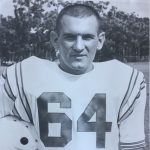 was a little bit of both, because I think that Uncle Butch has a mischievous side to him. I don’t think he was ever really bad, but as we all know, boys will be boys, so at least as a kid, my guess is that he tried to find out what his limits were.
was a little bit of both, because I think that Uncle Butch has a mischievous side to him. I don’t think he was ever really bad, but as we all know, boys will be boys, so at least as a kid, my guess is that he tried to find out what his limits were.
By the time he got into high school, Butch had discovered football, and that proved to be a great part of his school years. Lots of guys love to play, watch, eat, and sleep football, so to get to be part of the team is a cool thing. Uncle Butch was a good athlete, and was often talked about or written about in the local paper. He still loves all the local sports in Forsyth, Montana where he lived then, and still lives. He is probably one of their greatest boosters, and he knows the local talent personally, because it is a small town, so everyone knows everyone else. He is able to see their athletic growth, and knows the local teams’ stats. That’s what being a booster is all about. It’s one thing to cheer for a team, because they are the local kids, and another to know just how good the local kids are. The kids and the townspeople love Uncle Butch too, because he is a friendly guy who can always be counted on to lend a helping hand, or just to shoot the breeze. Uncle Butch is well liked, because he is so friendly.
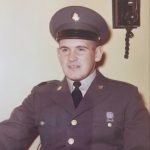
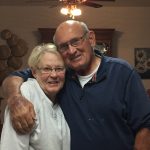
While Butch did live away from Forsyth for a short time, mostly while he was in the service, he has always been a local boy. He was born in Forsyth on November 9, 1940 to Andrew and Barbara (Fadhl) Schulenberg, and Forsyth would truly always be his home. Today is Uncle Butch’s 79th birthday. He doesn’t seem a day over 60 if you ask me. I think he’s a kid at heart and always will be. I will always treasure him. Happy 79th birthday Uncle Butch!! Have a great day!! We love you!!
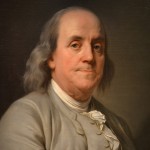
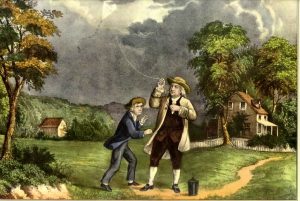 Most people think of Benjamin Franklin as the man who discovered electricity, and they would be right, but there was really so much more to the man that just that. While we think of Ben Franklin as a genius, and he was, he only had two years of actual schooling. After that, he quit school to help his family make soap and candles, and later, joined his brother, James as an indentured apprentice at a printing shop when he was twelve. This led to an obsession for books. Franklin loved the written word, and spent much of the little money he made to buy books. Because of his love of books, he became known as an author, printer, politician, postmaster, scientist, inventor, activist, statesman, and diplomat…all of it self taught.
Most people think of Benjamin Franklin as the man who discovered electricity, and they would be right, but there was really so much more to the man that just that. While we think of Ben Franklin as a genius, and he was, he only had two years of actual schooling. After that, he quit school to help his family make soap and candles, and later, joined his brother, James as an indentured apprentice at a printing shop when he was twelve. This led to an obsession for books. Franklin loved the written word, and spent much of the little money he made to buy books. Because of his love of books, he became known as an author, printer, politician, postmaster, scientist, inventor, activist, statesman, and diplomat…all of it self taught.
While much of Ben Franklin’s life was centered around serious accomplishments, he also had a human side. There were things that he felt strongly about. He left 2,000 pounds of sterling silver to Boston and Philadelphia, with the stipulation that the money be held for 100 years, and then a small percentage could be used for loans for local tradesmen. After that, the rest was to be saved for another 100 years. The rest of the funds were used to build the Franklin Institute in Philadelphia, and the Benjamin Franklin Institute of Technology in Boston. I’m not sure that was exactly what he wanted done with that balance, but it is a nice way to honor his memory.
Ben Franklin believed in the importance of fire prevention, and created the first volunteer fire department in 1736 called the Union Fire Company. Because he created it, the company was often called Benjamin Franklin’s Bucket Brigade. He also loved swimming, and he was a bit of an inventor there too. As a child, he used a kite to skim across the water, and he invented a pair of hand paddles that he used to navigate the Charles River. He was given an honorary induction in the International Swimming Hall of Fame.
All that is interesting, but to me one of his coolest accomplishments was the Glass Armonica. You might be wondering what that is, but if you have ever played a water glass with a damp finger, you would have a pretty 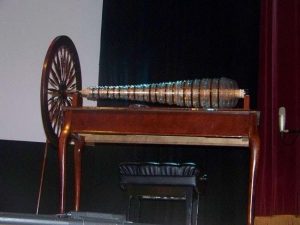
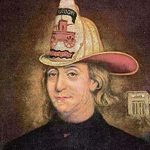 good idea how to play the Glass Armonica. Debuted in 1761, it was beautifully engineered with blown glass bowls. To play it, you simply wet your fingers and touched the various bowls to get a variety of sounds. The instrument was so popular that Beethoven and Mozart began creating music for it. Unfortunately the novelty wore off after a time, and that is why most people don’t even know what it is today. Ben Franklin was a man of many talents, and yet all we ever really thought about was the discovery of electricity.
good idea how to play the Glass Armonica. Debuted in 1761, it was beautifully engineered with blown glass bowls. To play it, you simply wet your fingers and touched the various bowls to get a variety of sounds. The instrument was so popular that Beethoven and Mozart began creating music for it. Unfortunately the novelty wore off after a time, and that is why most people don’t even know what it is today. Ben Franklin was a man of many talents, and yet all we ever really thought about was the discovery of electricity.
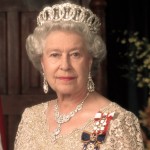
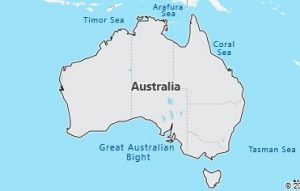 As nations grow in size, population, or power, many no longer want to be under the rule of another nation, even one that helped get them to where they are, and even one that has owned their land for years. It is something we, as Americans can’t really fathom, considering that we fought the Revolutionary War to leave British rule.
As nations grow in size, population, or power, many no longer want to be under the rule of another nation, even one that helped get them to where they are, and even one that has owned their land for years. It is something we, as Americans can’t really fathom, considering that we fought the Revolutionary War to leave British rule.
The decision was very different for Australia on November 6, 1999. Treasurer Wayne Swan and senior opposition figure Malcolm Turnbull, who once was Australia’s Republican Movement president, came together in the capital Canberra on the prior Monday to launch a book of essays called ‘Project Republic: Plans and Arguments for a New Australia’. Mr Turnbull, who sits on the front bench for the conservative opposition, described this latest push as “simply, purely patriotic” and called for an ‘interactive plebiscite’ to use cyberspace to better inform Australians of the issues surrounding constitutional change.
As it was, many feared the change, and the work and uncertainty that could accompany it. Still others, like being a part of the monarchy. “Many argue that the sexy celebrity status of William and Kate will sweep all before it and their star quality will revive the monarchy in Australia. I don’t think so,” Turnbull writes. “They will certainly be far more interesting and telegenic than Charles and Camilla – but I am not convinced that will translate into enhanced support for William (or indeed Charles) remaining our head of state.” His opinions aside, the people of Australia voted and decided that they just weren’t ready, and quite possibly they never would be ready to walk away from the British Monarchy. That actually happened in America too, because while 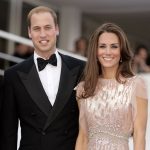
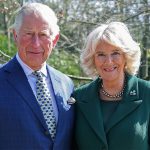 the overwhelming number of citizens wanted to go for independence, there were those who did not.
the overwhelming number of citizens wanted to go for independence, there were those who did not.
In Australia, it didn’t appear that the situation would have come to war, as it had in America, but one never really knows what can trigger a war of this type. I guess that in the case of Australia, if they are tired of the Queens rule, they have chosen to wait and see what the future ruling parties might bring. If they don’t like the outcome, they could always choose to break away at a later date.
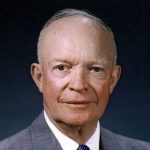 Every four years, Americans go to the polls to elect a new president. Looking at the first time that a president is elected, quite often, we know little about the person running for president. Even if they have been in Congress, it takes some digging to really discover who they are, and what they can do for our nation. We rely on things like the political party they belong to or the campaign promises they make. Still, we have no idea what the candidate will really do, until they are in office.
Every four years, Americans go to the polls to elect a new president. Looking at the first time that a president is elected, quite often, we know little about the person running for president. Even if they have been in Congress, it takes some digging to really discover who they are, and what they can do for our nation. We rely on things like the political party they belong to or the campaign promises they make. Still, we have no idea what the candidate will really do, until they are in office.
Sometimes, there are exceptions to that basic rule, however. Such was the case with Dwight D Eisenhower, who was the supreme commander of Allied forces in Western Europe during World War II. Of course, running a nation is not the same as running a war, unless the nation happens to be at war, that is. Nevertheless, a commander who excelled at leading a war, was by definition, a leader…making it a good bet that he could also lead a nation. Eisenhower was that kind of leader, and the people of the United States could see it clearly. He led the massive invasion of Nazi-occupied Europe that began on D-Day…June 6, 1944. Then in 1952, with victory under his belt, leading Republicans convinced Eisenhower, who by then was in command of NATO forces in Europe, to run for president. As the campaign progressed, it would remain to be seen, just how much the people of the United States thought that he would make a good leader for the nation. The election would be the telling point.
And so it went. Eisenhower won a convincing victory over Democrat Adlai Stevenson and would serve two terms in the White House (1953-1961). Even more amazing than his victory was the fact that General Dwight D Eisenhower won the American presidential elections with the largest number of popular votes ever recorded for a presidential candidate. It was a landslide victory. The people had spoken. Also of note, is that Eisenhower was the only other president to win the presidential election, having never served in any other political office. I’m sure everyone knows that the other president to do that is our current president…Donald Trump. That is an almost unheard of feat. A general and a businessman, both of whom had not been politically inclined, and yet, here they were. During his presidency, Eisenhower managed Cold War-era tensions with the Soviet Union under the looming threat of nuclear weapons, ended the war in Korea in 1953 and authorized a number of covert anti-communist operations by the CIA around the world. Here at home, America was in a period of relative prosperity, nevertheless, Eisenhower strengthened Social Security and created the massive new Interstate Highway System. Eisenhower was so well liked that he would beat Stevenson again four years later in a landslide to win re-election, despite health concerns after suffering a heart attack in 1955.
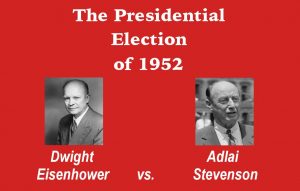
Eisenhower was born in Denison, Texas, on October 14, 1890. He grew up in Abilene, Kansas, as the third of seven sons in a poor family. His mother, a devout Mennonite and pacifist, was quite distressed when young Ike…as he was known…won an appointment to the US Military Academy at West Point, New York. Nevertheless, he went on to graduate in the middle of his class in 1915. While stationed as a second lieutenant in San Antonio, Texas, Eisenhower met Mamie Geneva Doud. The couple married in 1916 and had two sons, Doud Dwight, who died of scarlet fever as a small child, and John. World War I ended just before Eisenhower was scheduled to go to Europe, which was frustrating to the young officer, but he soon managed to acquire an appointment to the Command and General Staff College at Fort Leavenworth, Kansas. Graduating first in his class of 245, he served as a military aide to General John J Pershing, commander of US forces during World War I, and later to General Douglas MacArthur, US Army chief of staff. During his seven years serving under MacArthur, Eisenhower was stationed in the Philippines from 1935 to 1939.
Eisenhower returned soon after Nazi Germany’s invasion of Poland sparked the outbreak of World War II in Europe. In September 1941, he received his first general’s star with a promotion to brigadier general. After Japan attacked Pearl Harbor that December, US Army Chief of Staff General George C Marshall called Eisenhower to Washington, DC to work as a planning officer. Beginning in November 1942, Eisenhower headed Operation Torch, the successful Allied invasion of North Africa. He then directed the amphibious invasion of Sicily and the Italian mainland in 1943 that led to the fall of Rome in June 1944. In early 1943, he was made a full general. Eisenhower was appointed supreme commander of the Allied Expeditionary Force in December of that year and given the responsibility of spearheading the planned Allied invasion of Nazi-occupied Europe. On D-Day…June 6, 1944, more than 150,000 Allied forces crossed the English Channel and stormed the beaches of Normandy. The invasion led to the liberation of Paris on August 25 and turned the tide of the war in Europe decisively in the Allied direction. Having risen from lieutenant colonel in the Philippines to supreme commander of the victorious forces in Europe in only five years, Eisenhower returned home to a hero’s welcome in 1945 to serve as chief of staff of the US Army.
In 1948, Eisenhower left active duty and became president of New York City’s Columbia University. His brief 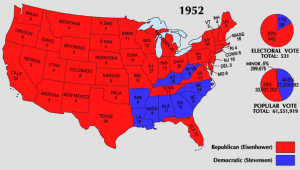 return to civilian life ended in 1950, however, when President Harry S Truman asked him to take command of the new North Atlantic Treaty Organization (NATO) forces in Europe. In that position, Eisenhower worked to create a unified military organization that would combat potential communist aggression around the globe. As President of the United States, while weathering criticism from both left and right, Eisenhower enjoyed high approval ratings throughout his administration. After leaving office in January 1961, he retired to his farm in Gettysburg, Pennsylvania. He worked largely on his memoirs, and would publish several books over the following years. He died on March 28, 1969, after a long illness.
return to civilian life ended in 1950, however, when President Harry S Truman asked him to take command of the new North Atlantic Treaty Organization (NATO) forces in Europe. In that position, Eisenhower worked to create a unified military organization that would combat potential communist aggression around the globe. As President of the United States, while weathering criticism from both left and right, Eisenhower enjoyed high approval ratings throughout his administration. After leaving office in January 1961, he retired to his farm in Gettysburg, Pennsylvania. He worked largely on his memoirs, and would publish several books over the following years. He died on March 28, 1969, after a long illness.
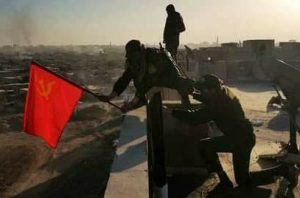 The ending of a war, does not always mean the beginning of peace, or even the end of fighting. Those who lost, don’t usually like the fact that they lost. As World War I drew to a close, angry rebels in both Germany and Austria-Hungary carried out a revolt on November 3, 1918, raising the red banner of the revolutionary socialist Communist Party and threatening to follow the Russian example in bringing down their imperialist governments.
The ending of a war, does not always mean the beginning of peace, or even the end of fighting. Those who lost, don’t usually like the fact that they lost. As World War I drew to a close, angry rebels in both Germany and Austria-Hungary carried out a revolt on November 3, 1918, raising the red banner of the revolutionary socialist Communist Party and threatening to follow the Russian example in bringing down their imperialist governments.
By the last week of October 1918, three of the Central Powers…Germany, Austria-Hungary, and the Ottoman Empire…were in talks with the Allies about reaching an armistice, while the fourth, Bulgaria, had concluded talks in September. On October 28, approximately 1,000 sailors in the German navy were arrested because they refused to follow orders from their commanders to launch a last-ditch attack against the British in the North Sea.
The rebels soon immobilized the German fleet. Then, the resistance spread to the German city of Kiel, where some 3,000 sailors and workers raised the red flag of communism on November 3. Admiral Wilhelm Souchon, the governor of Kiel, quickly called on naval officers who were loyal to the government to suppress the revolt. During the ensuing battle, eight rebels were killed, but the general resistance continued.
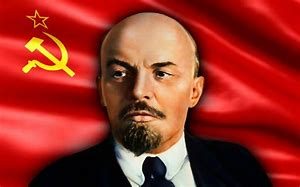 Meanwhile, the revolution was spreading in Vienna, as well as in Budapest, where the former Hungarian prime minister, Count Istvan Tisza, was assassinated by members of the communist-led Red Guard on October 31. By now, the empire was in shambles, so the Austro-Hungarian government secured an armistice with the Allied powers on November 3rd, ending its participation in World War I. That same day in Moscow, at a mass rally in support of the Austrian rebels, the communist leader Vladimir Lenin declared triumphantly: “The time is near when the first day of the world revolution will be celebrated everywhere.” It seems that evil will try to reincarnate, wherever it can find a group sympathetic to its cause.
Meanwhile, the revolution was spreading in Vienna, as well as in Budapest, where the former Hungarian prime minister, Count Istvan Tisza, was assassinated by members of the communist-led Red Guard on October 31. By now, the empire was in shambles, so the Austro-Hungarian government secured an armistice with the Allied powers on November 3rd, ending its participation in World War I. That same day in Moscow, at a mass rally in support of the Austrian rebels, the communist leader Vladimir Lenin declared triumphantly: “The time is near when the first day of the world revolution will be celebrated everywhere.” It seems that evil will try to reincarnate, wherever it can find a group sympathetic to its cause.
 On mornings when I wake up with a backache, the idea of sleeping in a zero gravity chamber sounds appealing, but in reality, living in a zero gravity environment is probably not something I would want to do for very long. While I admit, gravity can put a strain on our bodies in many ways, I don’t think we were really designed to live our whole life without gravity. Nevertheless, living and working in space have become more commonplace than many of us realize. We don’t give much thought to the men and women who live and work in the International Space Station, or in the various crafts that have transported them there over the years.
On mornings when I wake up with a backache, the idea of sleeping in a zero gravity chamber sounds appealing, but in reality, living in a zero gravity environment is probably not something I would want to do for very long. While I admit, gravity can put a strain on our bodies in many ways, I don’t think we were really designed to live our whole life without gravity. Nevertheless, living and working in space have become more commonplace than many of us realize. We don’t give much thought to the men and women who live and work in the International Space Station, or in the various crafts that have transported them there over the years.
It was on November 2, 2000, that the first residential crew would arrive aboard the International Space Station (ISS). The arrival of Expedition 1 was the mark of the beginning of a new era of international cooperation in space and of the longest continuous human habitation in low Earth orbit…and it continues to this day…even without the Space Shuttle’s operation…though I don’t think it is as easy to work out the logistics without the Space Shuttle. Two Russians, Yuri Gidzenko and Sergei Krikalev, accompanied by NASA’s Bill Shepherd, were selected as the crew of Expedition 1.
It was decided that we needed an International Space Station in 1998, and the space agencies of the United States, Russia, Canada, Japan and Europe agreed to cooperate to bring it to pass. Its first components were launched into orbit later that year. In all, there would be five space shuttle flights and two unmanned Russian flights to complete the delivery of many of its core components and partially assemble the space station. It was  a huge project that would possibly accomplish in space, what we had never been able to accomplish on Earth…nations working together on experiments that mattered to all of them to bring about changes in key areas like health, agriculture, energy, and a host of other things. The ISS was truly a first.
a huge project that would possibly accomplish in space, what we had never been able to accomplish on Earth…nations working together on experiments that mattered to all of them to bring about changes in key areas like health, agriculture, energy, and a host of other things. The ISS was truly a first.
The two cosmonauts and the astronaut arrived at the ISS on a Russian Soyuz rocket that had been launched from Kazakhstan. This first mission was tasked mostly with constructing and installing various components and activating others. This was sometimes easier said than done, and in fact, the crew reported that it took over a day to activate one of the station’s food warmers. I hope they weren’t too hungry!! Throughout their time in space, they were visited and resupplied by two unmanned Russian rockets and three space shuttle missions, one of which brought the photovoltaic arrays, giant solar panels, which provide most of the station’s power.
Shepherd, Gidzenko and Krikalev became the first humans to adjust to long-term life in low orbit, circling the Earth roughly 15.5 times a day and exercising at least two hours a day in order to offset the muscle atrophy that occurs in low gravity. This is where I thought relief of backaches for sleeping wrong might have been solved, but it turns out that there were a host of other problems that come for long-term weightlessness. Who knew? Things like lessened bone density, and pain in joints upon returning to Earth. Hmmm, I guess I’ll sleep here on Earth in gravity, and take Excedrin as needed.
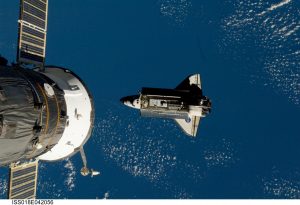 Finally, on March 10, four months after they arrived at the ISS, the space shuttle Discovery brought three new residents to relieve Expedition 1, who landed back on Earth at the Kennedy Space Center on March 21. Since then, humans have continuously resided on the ISS, with plans to continue until at least 2030. 236 people from 18 nations have visited the station and a number of new modules have been added, many for the purpose of research into biology, material sciences, the feasibility of further human space travel and more. Some tams have been there longer than other teams, but all of them have made great contributions to science during their time on the ISS.
Finally, on March 10, four months after they arrived at the ISS, the space shuttle Discovery brought three new residents to relieve Expedition 1, who landed back on Earth at the Kennedy Space Center on March 21. Since then, humans have continuously resided on the ISS, with plans to continue until at least 2030. 236 people from 18 nations have visited the station and a number of new modules have been added, many for the purpose of research into biology, material sciences, the feasibility of further human space travel and more. Some tams have been there longer than other teams, but all of them have made great contributions to science during their time on the ISS.
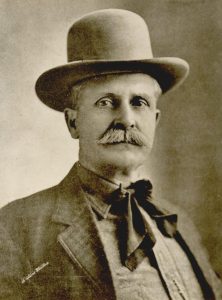 Unfortunately, there are among us, people who are corrupt and ruthless, and sometimes, things happen because of corruption, anger, or even stupidity. William Tilghman was born in Fort Dodge, Iowa on July 4, 1854, at the height of the “Wild West” era. He was a man who wanted something more, so at 16 years old, he moved west. As sometimes happened, men who went west, toyed with the wild life that was brought about by the lawless area. Tilghman was no different. He fell in with a bad crowd of young men who stole horses from the Indians. After several narrow escapes with angry Indians, Tilghman decided that rustling was too dangerous and settled in Dodge City, Kansas, where he briefly served as a deputy marshal before opening a saloon. He was arrested twice for alleged train robbery and rustling, but the charges did not stick. It was a shaky start, but Tilghman gradually built a reputation as an honest and respectable young man in Dodge City. Before long, he became the deputy sheriff of Ford County, Kansas. Later, he was offered and accepted the job of the marshal of Dodge City…a real life Matt Dillon, from Gunsmoke.
Unfortunately, there are among us, people who are corrupt and ruthless, and sometimes, things happen because of corruption, anger, or even stupidity. William Tilghman was born in Fort Dodge, Iowa on July 4, 1854, at the height of the “Wild West” era. He was a man who wanted something more, so at 16 years old, he moved west. As sometimes happened, men who went west, toyed with the wild life that was brought about by the lawless area. Tilghman was no different. He fell in with a bad crowd of young men who stole horses from the Indians. After several narrow escapes with angry Indians, Tilghman decided that rustling was too dangerous and settled in Dodge City, Kansas, where he briefly served as a deputy marshal before opening a saloon. He was arrested twice for alleged train robbery and rustling, but the charges did not stick. It was a shaky start, but Tilghman gradually built a reputation as an honest and respectable young man in Dodge City. Before long, he became the deputy sheriff of Ford County, Kansas. Later, he was offered and accepted the job of the marshal of Dodge City…a real life Matt Dillon, from Gunsmoke.
Tilghman was one of the first men into the territory when Oklahoma opened to settlement in 1889, and he became a deputy US marshal for the region in 1891. In the late 19th century, lawlessness was still very much a part of Oklahoma. Tilghman helped to bring order the to area by ridding Oklahoma by capturing some of the most notorious bandits of the day. While locking up many criminals, Tilghman, nevertheless, managed to earn a well-deserved reputation for treating even the worst criminals fairly and protecting the rights of the unjustly accused. Any man, who found himself in Tilghman’s custody, knew he was safe from angry vigilante mobs, 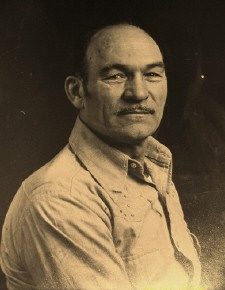 because Tilghman had little tolerance for those who took the law into their own hands. In 1898, a wild mob lynched two young Indians who were falsely accused of raping and murdering a white woman. Tilghman arrested and secured prison terms for eight of the mob leaders and captured the real rapist-murderer.
because Tilghman had little tolerance for those who took the law into their own hands. In 1898, a wild mob lynched two young Indians who were falsely accused of raping and murdering a white woman. Tilghman arrested and secured prison terms for eight of the mob leaders and captured the real rapist-murderer.
In 1924, after serving a term as an Oklahoma state legislator, making a movie about his frontier days, and serving as the police chief of Oklahoma City, Tilghman might well have been expected to quietly retire. However, it was the height of the Prohibition era, and the old lawman was unable to hang up his gun. He still felt a calling to keep law and order in his town. He accepted a job as city marshal in Cromwell, Oklahoma. On November 1, 1924, William Tilghman, who was known to both friends and enemies alike as “Uncle Billy” was murdered by a corrupt prohibition agent who resented Tilghman’s refusal to ignore local bootlegging operations. The Prohibition officer was drunk, and in his anger, made the worst mistake of his life.
 Every year…like clockwork, parents dress their children up in costumes, and the annual tradition of children roaming the neighborhoods, knocking on doors, and asking for treats…with the threat of tricks, if the “blackmail” is not paid…begins. It’s Halloween, of course. These days, not as many children really understand how the whole thing is supposed to work. They just see it as a day to gather up as much candy as possible. I read somewhere that children consume, on average, 7,000 calories worth of candy…or the equivalent of almost 11 Burger King Whoppers, without cheese, and not the new meatless version, of course. It’s a good thing that most kids are very active, or that many calories could be bad. And that isn’t even considering the sugar high that the parents will have to deal with. Try putting that child to bed after all that, and you’ll find that it’s going to be a long night. The best
Every year…like clockwork, parents dress their children up in costumes, and the annual tradition of children roaming the neighborhoods, knocking on doors, and asking for treats…with the threat of tricks, if the “blackmail” is not paid…begins. It’s Halloween, of course. These days, not as many children really understand how the whole thing is supposed to work. They just see it as a day to gather up as much candy as possible. I read somewhere that children consume, on average, 7,000 calories worth of candy…or the equivalent of almost 11 Burger King Whoppers, without cheese, and not the new meatless version, of course. It’s a good thing that most kids are very active, or that many calories could be bad. And that isn’t even considering the sugar high that the parents will have to deal with. Try putting that child to bed after all that, and you’ll find that it’s going to be a long night. The best  you can hope for is that the day falls on a Friday, so they don’t have to get up for school the next day…not the case this year, unfortunately.
you can hope for is that the day falls on a Friday, so they don’t have to get up for school the next day…not the case this year, unfortunately.
So, with all the negative aside, the costumes people come up with are usually very cute. I prefer the costumes that don’t focus on the gruesome and horrific, but there are always a few of those. This year, with all my grandchildren grown up, we will only have our little great granddaughter heading out to see what she can come home with. At just 17 months, she will most likely only be going a few places, and since she is so little, she isn’t as totally addicted to candy as she will most likely become in future years. Nevertheless, I’ve never seen her turn down a treat either.
I remember Halloweens past, when my grandchildren were little. They couldn’t wait to get out there, and they 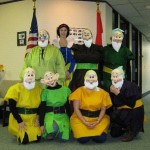 really preferred if their parents didn’t stand around and talk. After all, they had rounds to make, and it wasn’t getting any earlier. My grandchildren, Chris Petersen, Shai Royce, Caalab Royce, and Josh Petersen, always had the cutest costumes. I suppose I might be a bit biased, but I don’t care. I’m sure every parent and every grandparent feels the same way about their own little ones. It’s our prerogative!! Our little ones never had any tricks up their sleeves, that I knew of, but I do recall the year when I, as a little kid, was handed a little bar of soap, by my mother, Collene Spencer. It was my “trick” and I was only asked by one person, what trick I had up my sleeve. When I showed him the soap, he let out a great big guffaw!! He had no idea that I would even know what he meant. He said that it made his whole day!! Happy Halloween everyone!! Be safe out there!!
really preferred if their parents didn’t stand around and talk. After all, they had rounds to make, and it wasn’t getting any earlier. My grandchildren, Chris Petersen, Shai Royce, Caalab Royce, and Josh Petersen, always had the cutest costumes. I suppose I might be a bit biased, but I don’t care. I’m sure every parent and every grandparent feels the same way about their own little ones. It’s our prerogative!! Our little ones never had any tricks up their sleeves, that I knew of, but I do recall the year when I, as a little kid, was handed a little bar of soap, by my mother, Collene Spencer. It was my “trick” and I was only asked by one person, what trick I had up my sleeve. When I showed him the soap, he let out a great big guffaw!! He had no idea that I would even know what he meant. He said that it made his whole day!! Happy Halloween everyone!! Be safe out there!!
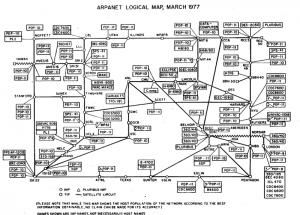 In this technological age, everyone has heard of the internet…even those who don’t know how to use it. It is thought to be the most advanced way to access information, and that is true. People don’t have to even leave their homes to have access to information, products, email, or media…even social media. It was an amazing invention, and some might say it was a time hog. It was the invention of all time, but…it wasn’t the first of it’s kind.
In this technological age, everyone has heard of the internet…even those who don’t know how to use it. It is thought to be the most advanced way to access information, and that is true. People don’t have to even leave their homes to have access to information, products, email, or media…even social media. It was an amazing invention, and some might say it was a time hog. It was the invention of all time, but…it wasn’t the first of it’s kind.
On October 29, 1969, the Advanced Research Projects Agency Network (ARPANET) an early packet-switching network and the first network to implement the TCP/IP protocol suite was presented. Both of those technologies became the technical foundation of the Internet. The ARPANET was initially founded by the Advanced Research Projects Agency (ARPA) of the United States Department of Defense. It seems fitting to me that the Department of Defense would be the first ones to access such instantaneous information sources. Many people and even government agencies might have thought that the average person had no need to be able to access such information, but that would be wrong. Now it’s vital.
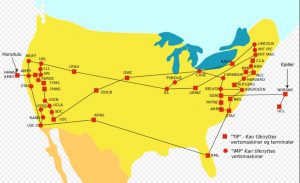
Paul Baran, Donald Davies, Leonard Kleinrock, and Lawrence Roberts came up with the concepts, and designed the packet-switching methodology employed in the ARPANET. The TCP/IP communications protocols were developed for the ARPANET by Robert Kahn and Vint Cerf. They also incorporated concepts from the French CYCLADES project directed by Louis Pouzin. As the network development progressed, protocols for internetworking were developed by which multiple separate networks could be joined into a network of networks. Access to the ARPANET was expanded in 1981, when the National Science Foundation (NSF) funded the Computer Science Network (CSNET). In 1982, the Internet protocol suite (TCP/IP) was introduced as the standard networking software stack in the ARPANET. In the early 1980s, the NSF funded the establishment of national supercomputing centers at several universities, and provided network access and network interconnectivity with the NSFNET project in 1986. The ARPANET project was formally decommissioned in 1990, 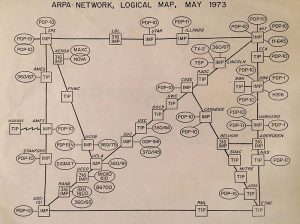 after partnerships with the telecommunication industry paved the way of future commercialization of a new world-wide network…the Internet.
after partnerships with the telecommunication industry paved the way of future commercialization of a new world-wide network…the Internet.
I’m sure that, like the pre-windows DOS program, the ARPANET was quite a bit more primitive. Still, it was an amazing thing to be able to connect with people who were a good distance away from you, and pass data along to them. Of course, the only ones who had access were those in the network, but then when you think about it, if you don’t have internet access, you are out of the loop too, so I guess it is no different really. Most of us thought that the internet was a unique invention, but in reality, it was second in line.

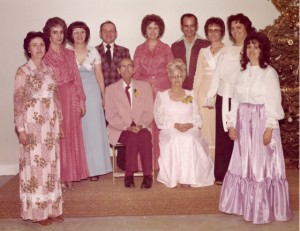 Where my Aunt Evelyn Hushman was the beginning of my grandma and grandpa, Hattie and George Byer’s large family, Aunt Sandy Pattan was the end. Between them were 17 years and 7 siblings. When Aunt Sandy arrived, my grandparents had a disagreement as to what her name would be. My grandfather wanted to name her Sonya (or maybe Sonja, we will never know, since the name lost), but my grandmother wanted to name her Sandra. They simply could not agree, so the decision was made for Grandpa to go home and tell the rest o the children about the birth, and let a majority rule vote of the children settle the dispute. So, Grandpa went home and told the children about their little sister. Then he told them about the name dispute. They were to decide. Trying as hard as he could to make Sandra sound as plain as he could and, Sonya sound like the most beautiful name in the world, Grandpa waited for the decision. He didn’t have to wait long. Almost the split second he said Sonya, the children all said, “Eeeeewwww!! Sonya!! No way!! We choose Sandra!!”
Where my Aunt Evelyn Hushman was the beginning of my grandma and grandpa, Hattie and George Byer’s large family, Aunt Sandy Pattan was the end. Between them were 17 years and 7 siblings. When Aunt Sandy arrived, my grandparents had a disagreement as to what her name would be. My grandfather wanted to name her Sonya (or maybe Sonja, we will never know, since the name lost), but my grandmother wanted to name her Sandra. They simply could not agree, so the decision was made for Grandpa to go home and tell the rest o the children about the birth, and let a majority rule vote of the children settle the dispute. So, Grandpa went home and told the children about their little sister. Then he told them about the name dispute. They were to decide. Trying as hard as he could to make Sandra sound as plain as he could and, Sonya sound like the most beautiful name in the world, Grandpa waited for the decision. He didn’t have to wait long. Almost the split second he said Sonya, the children all said, “Eeeeewwww!! Sonya!! No way!! We choose Sandra!!”
Poor Grandpa. The decision saddened him. He liked the name Sonya. Nevertheless, Grandpa was an honorable man. The name Sandra had been chosen, and Sonya was out. He would accept that. I’m sure Grandma was happy, and my Aunt Sandy has told me that she is thankful, because she doesn’t think she would have liked the name Sonya. Maybe not, but once a name is given, most people can’t imagine themselves as anyone else. People tend to fit the name given, whether it is unusual or common. I can’t imagine having an Aunt Sonya, but then that is because I have always had an Aunt Sandy. That’s who she is, and it’s as simple as that.
Aunt Sandy must have some of the name/heritage gene in her blood, because she is as curious as I am about things like family history, and name history. We like to know if a name came from way back in the family, was made up, or picked out of a book. It doesn’t really matter which one it is, it’s really about the search. Aunt 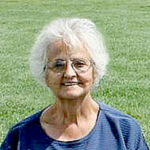
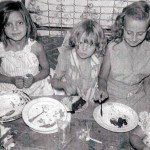 Sandy is a great teller of family stories. She remembers them in great detail. I could sit and listen to her all day. Many people don’t understand the importance of the family history, and people like Aunt Sandy and me, are important, because without someone to keep the stories alive, the family history could die, and that would be truly tragic. I’m grateful to have Aunt Sandy, who is still able to tell me the stories, so that when some of the kids in the family discover their interest, the story will still be there. Today is Aunt Sandy’s 74th birthday. Happy birthday Aunt Sandy!! Have a great day!! We love you!!
Sandy is a great teller of family stories. She remembers them in great detail. I could sit and listen to her all day. Many people don’t understand the importance of the family history, and people like Aunt Sandy and me, are important, because without someone to keep the stories alive, the family history could die, and that would be truly tragic. I’m grateful to have Aunt Sandy, who is still able to tell me the stories, so that when some of the kids in the family discover their interest, the story will still be there. Today is Aunt Sandy’s 74th birthday. Happy birthday Aunt Sandy!! Have a great day!! We love you!!

